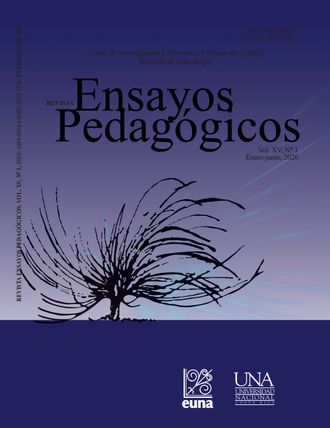Nicaraguan Immigrant Adolescents in the Costa Rican Education System: Reflections from and for Counseling
DOI:
https://doi.org/10.15359/rep.15-1.10Keywords:
immigration, interculturality, Counseling, Costa Rican educational system, education, equityAbstract
This article arises from a research process on the analysis of the educational reality of being an immigrant from the social-educational experiences of Nicaraguan immigrant adolescents, in order to open spaces for reflection and analysis from the discipline of Counseling and its scope of action in the educational system. The study was carried out with ten Nicaraguan immigrant adolescents in the Costa Rican educational system and the results of the research were socialized and discussed with students of the Counseling major at Universidad Nacional, to establish a reflective space in light of possible areas of intervention from the discipline. These results come from three categories of analysis: The perception of being an immigrant student, decision-making and consequences of immigration, and finally, educational challenges from which conclusive ideas are established in a permanent reflection, such as the importance of a constant reflection on the processes of counseling around diversity and interculturality from human dignity, as well as the maximization of abilities and skills for human development.
References
Apud, I. (2013). Repensar el método etnográfico. Hacia una etnografía multitécnica, relfexiva y abierta al diálogo interdisciplinario. Revista Antropología Arqueológica, 16, 213-235. Recuperado de https://revistas.uniandes.edu.co/doi/pdf/10.7440/antipoda16.2013.10
Arroyo, M. (2013). La Educación Intercultural: un camino hacia la inclusión educativa. Revista de Educación Inclusiva, 6(2), 144-159. Recuperado de https://dialnet.unirioja.es/servlet/articulo?codigo=4335836
Dirección General de Migración y Extranjería (DGME). (2017). Diagnóstico del Contexto Migratorio de Costa Rica 2017. San José, Costa Rica: DGME.
Dirección General de Migración y Extranjería (DGME). (2019). Plan Nacional de Integración para Costa Rica 2018-2022. San José: DGME.
Donoso, G. (2014). El duelo migratorio. Recuperado de http://www.tanatologia-amtac.com/descargas/tesinas/136%20Duelo%20migratorio.pdf
Edwards. A. (2016). ¿Refugiado o migrante? ¿Cuál es el término correcto? United Nations High Commissioner for refugees. Recuperado de https://www.acnur.org/noticias/noticia/2016/7/5b9008e74/refugiado-o-migrante-cual-es-el-termino-correcto.html
Leiva, J. (2016). Abriendo caminos de interculturalidad e inclusión en la escuela. Madrid, España: Editorial DYKINSON, S. L.
Micolta, A. (2005). Teorías y conceptos asociados al estudio de las migraciones internacionales. Trabajo social, 7, 59-76. Recuperado de https://dialnet.unirioja.es/servlet/articulo?codigo=4391739
Organización de los Estados Americanos (OEA). (2016). Equidad e Inclusión social: superando desigualdades hacia sociedades más inclusivas. Washington: Departamento de Inclusión Social, Secretaría de Acceso a Derechos y Equidad, OEA.
UNESCO. (2018). Resumen del Informe de seguimiento de la educación en el mundo 2019: Migración, desplazamiento y educación: Construyendo puentes, no muros. París: UNESCO.
Published
How to Cite
Issue
Section
License
Ensayos Pedagógicos is subscribed to the Attribution-NonCommertial-NoDerivatives 4.0 International Creative Commons Licence, which allows both authors and readers to freely download, store, copy, and distribute the final approved publisehd version of the manuscript (post-print) as long as this is done without commercial purposes, no derivative works are generated, and the source and author are mentioned. As well, Ensayos Pedagógicos declares that authors will remain the rightful owners of the copyrights of their work in perpetuity.







